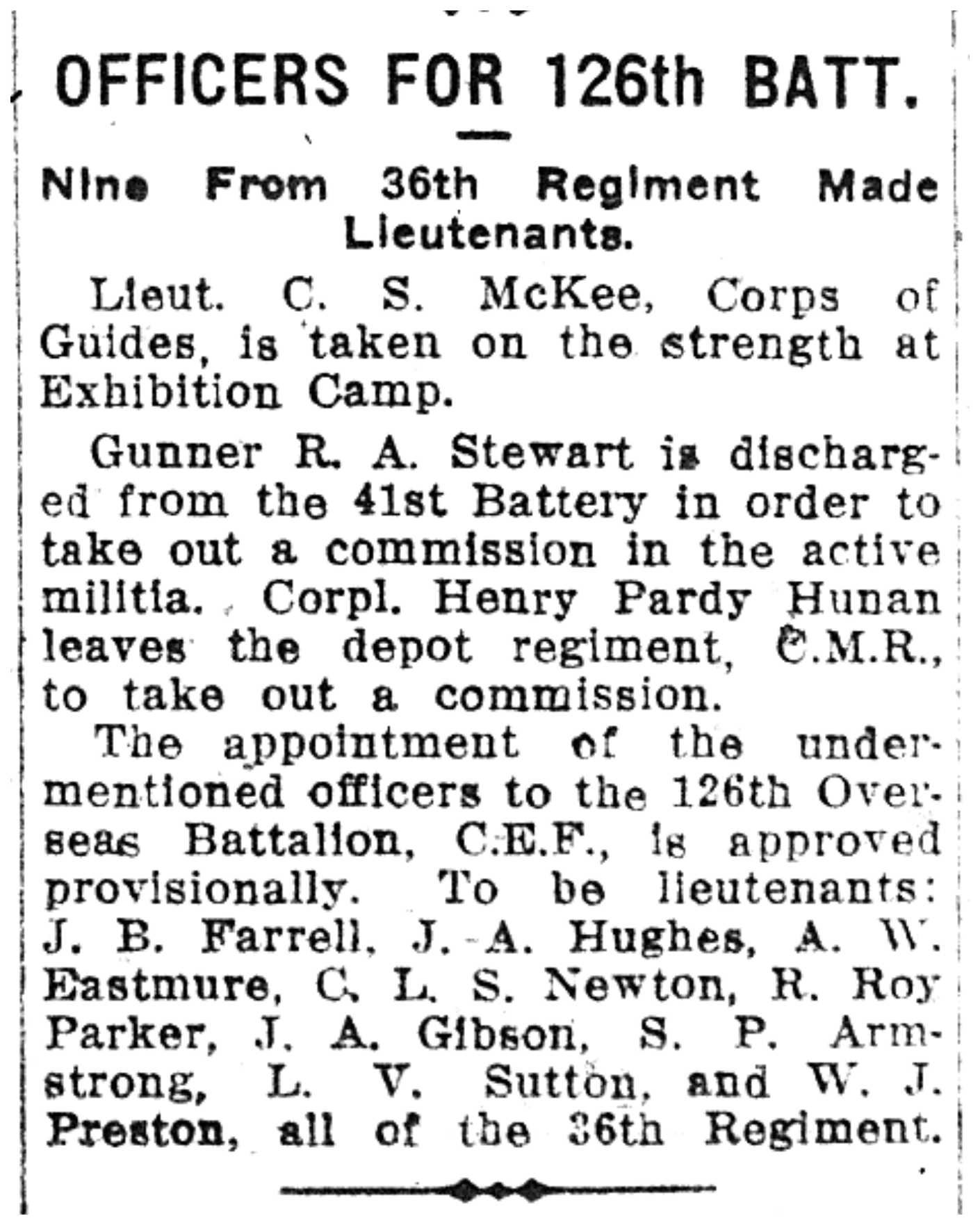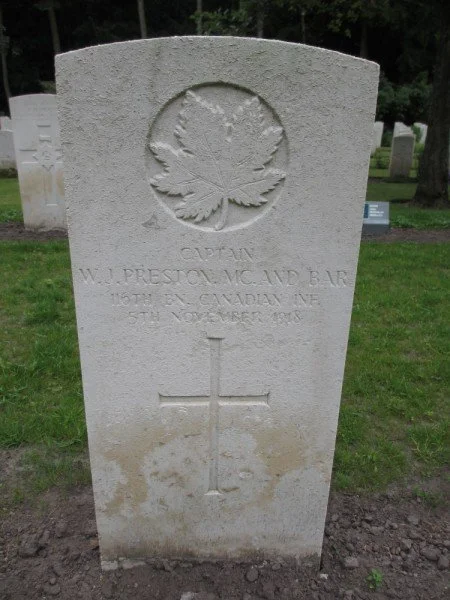Captain Wilfred John Preston
22 Years Old
Born in Toronto, ON
Enlisted with 126th Battalion and served with 116thBattalion
Died of wounds as a POW – on Nov 5, 1918
Buried at Cologne Southern Cemetery in Recklinghausen, Westphalia
“To the Captain!”
“To the Captain!”
From within the cigarette and pipe smoke-filled legion halls, community centres and banquet halls, for years upon years after their time ‘over there’ in France the men would gather and reunite as a Battalion. With each reunion, glasses would be raised in the honour and memory of those who were left behind. Some were their close friends…the men whose memory led to more than a few tears shed in the eyes of the aging warriors. Other glasses were raised for the prominent men of the battalion…”To Lt. Col Samuel Simpson Sharpe…to Pearkes…to Carmichael! However, there were always glasses raised for those rare individuals who made such an impression and imprint upon the men that they just had to be remembered and recognized. Those were the ones who left a legacy in the minds and lives of those entrusted to their care. These were the battlefield leaders…the men whom with pistols raised, were the first over the top and shepherded their men across and into the fire. Those were the ones who they looked up to guidance and direction, for courage and comfort. These were the ones who gave the men hope…hope that if they followed him, they just might get a chance to see their wives, their children, their parents once again. One of these such men…a man whose name when recited was followed with the clinking of many glasses, was their Captain Wilfred John Preston.
Captain Wilfred John Preston was born in Toronto 1896 and grew up in the neighbourhood of Roncesvalles. His family’s house was situated in a rapidly growing area of the city where large homes accompanied well-treed streets. He attended the local high school, Parkdale Collegiate Institute and was well renowned as both a rugby player and paddler with the Parkdale Canoe Club. Like many of the boys his age, when the recruitment drive washed through Canada and Toronto in 1915, Preston decided to enlist. He had some military training from his time serving as a signaler with the 36thPeel Regiment and this positioned him well to become an officer when he joined the 126th Peel Battalion.
The transition of Preston from an ambitious young officer to noted leader of men in battle was rather remarkable. With his background as a signaller, upon being transferred to the 116th Battalion in October of 1916 he assumed the head of Communications for the Battalion. Following the victory at Vimy when the men were used as working parties, it would have been Preston’s responsibility to plan and engage his men in helping build the communications infrastructure within the trenches. Installing telephone lines from the newly acquired front line trenches back to the reserve and ensured that headquarters would be able to guide and direct their men in active operations. However, his first key battlefield position was to establish communications to support the two waves of troops deployed in the trench raid on Fosse 4 slag heap at Avion on July 23, 1917. His task was to design a diverse communications plan whereby the troops from the initial wave of the attack could signal back to the next company once they successfully completed their objectives. The plan was for a combination of lamps/torches to be used alongside telephone wires extending from the front to the rear. Unfortunately, his first important task almost turned out to be a colossal failure. Almost immediately, the Germans cut the primary telephone lines with shellfire. Plan two was also a disaster due to the immense amount of smoke generated from the artillery barrage. This hampered the men in the second wave from seeing the signals from the men in the first wave of the attack. Thankfully, the third option included runners and they rushed back to provide verbal confirmation for the men to proceed.
As the war proceeded through into the fall of 1917, Lieutenant Preston was promoted to Platoon Commander. This was followed in April 1918 as he was further promoted to Acting Captain then to full Captain in July. While these promotions were evidence that the officer staff saw value and promise in the young 22 year old, it would not be until the battle of Amiens on Aug 8th, 1918 where the men under his care would truly see the value of serving with a man of such bravery and character. The objective for the Battalion on that day was to traverse 2 miles over unfamiliar land, against enemies whose positions and bunkers were also indetermined. The orders were to kill or capture any German who stood between their jumping off position and Hamon Wood, 3000 yards away. It was during this drive that Preston was able to devise a plan, gather those who were not killed in a devastating machine gun barrage and ultimately take the high ground. Preston did just that…he led the smattering of soldiers across the battlefield, captured an enemy battery of field guns and took forty prisoners. For this courage and bravado, the young Captain would later be awarded the Military Cross.
After Amiens, in the following days the 116thproceeded to take another wood stand at Le Quesnel, move through and take a series of objectives called Middle Wood and then Square Wood. After that they would move on a take the village of Parvillers. In each attack that the 116th was ordered to execute, Captain Preston would lead his men over the to and up to the objective. The next operation where his efforts and courage was on full display was at Bois du Vert in the attack on Boiry Notre Dame on Aug 28, 1918. Throughout two days of fighting, Preston pressed on through gas attacks, artillery barrages, devastating machine gun attacks. With each leap forward he would collect his men and drive forward capturing territory and German POWs. In this operation alone, he was able to secure 2 German Officer and 65 men of their ranks. For these fine examples of bravery beyond the call of duty, he received a Bar to his Military Cross.
People could have attributed the success Preston gained on the battlefield to his bravado, to his professionalism, to his calm nature under times of immense pressure…however some would admit that the fact that he was able to make it this far was due to a healthy amount of good luck. However, in warfare, especially warfare in WW1 luck came in many forms. Luck could be in being in the right place at the wrong time. It could equally be being in the wrong place at the right time, whereby a slight flesh would give you a first-class ticket home. It could also be due to the fact that eventually your good luck may run dry and when combined with time, the chance that you get hit from the blizzard of lead that was hurled in your direction grew stronger. This happened to Captain Preston on the morning of Sept 29th, 1918.
As the sun began to illuminate the horizon on that fateful day the troops were readying themselves for another day occupying the tip of the spear. The evening prior was wet and rainy and the best they could conjure was some warm coffee and biscuits before heading to the jumping off point. For many of these untried and untested soldiers, this would have been a torturous time. Unsure of their chance of survival. Worried that they would never return home to their families. The old hands would have accepted that those chances were low long, long ago. Yet, for the men serving under Captain Preston, they at least had the comfort that they were under solid, stable, competent, and confident command. Between the start of this campaign seven weeks prior and that morning, Preston had participated in every operation and personally led his men over the top 9 successive times. The morning of the 29th would be his tenth…and as chance is a fickle fiend it proved to be victor on that sorrowful morn. Amidst the screech of the whistles and drowned out by the din of combat, somewhere between Ste Olle and Petit Fontaine on the outskirts of Cambrai, Captain Preston received serious machine gun bullet wounds to both of his legs and his left hand. He was the Company Commander in charge of one of the two Companies, A and B, which were both effectively wiped out. As the Battalion pressed on the wounded were left to their own devices…many who fell into the hands of the enemy Germans occupying the areas in and around the city of Cambrai. Severely wounded and unable to move Captain Preston was taken prisoner by the Germans and moved to sectors in their rear for care.
The final chapter in the story of Captain Wilfred John Preston was unfitting to a man of his achievements and character. Seriously wounded, he was now in the care of the enemy. He was transported 400 kms away to the Recklinghausen Hospital in Cologne. It was here amidst the deluge of German casualties from the devastating Canadian-led campaign where he was treated. As his injuries were severe, it was determined by the medical staff that his leg needed to be amputated. However, Preston was in terrible shape and needed a blood transfusion to make up for his significant blood loss. Despite requests from his injured comrade, Private Herrivan to assist and offer their blood to their stricken comrade, the German doctors refused. Thus, it was there, on a cot in the midst of a sea of enemy wounded that the Captain succumbed to his wounds. He is buried in the Cologne Southern Cemetery in Recklinghausen, Westphalia…a 400 km distance from Ste Olle where he sustained his injuries.
Raise a glass to his memory…raise a glass to the Captain. “To the Captain!”






